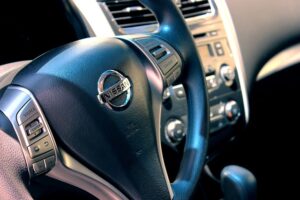To select the best car insurance policy:
1. Assess Needs and Budget: Understand your driving record, age, location, vehicle type, and budget to determine eligibility for discounts or higher premiums.
2. Compare Coverage Types: Differentiate between liability (protects against damages caused to others) and comprehensive coverage (insures against various risks). Choose based on your driving habits, vehicle type, and budget.
3. Evaluate Limits & Deductibles: Understand coverage limits (protection for damages) and deductibles (out-of-pocket cost before insurance kicks in) to balance quality of coverage with affordability.
4. Research Insurer Reputation: Look for companies with high ratings from reputable agencies like A.M. Best or J.D. Power, and read reviews from current/past policyholders.
5. Leverage Online Reviews: Use platforms and forums to gain real-world insights into insurers' reliability, claims handling, and customer service.
6. Explore Optional Features: Consider perks like weather-related coverage, student discounts, roadside assistance, data security options, and more based on your specific needs.
7. Claim Discounts and Savings: Inquire about safe driver, bundle, good student, membership, credit score, and anti-theft device discounts.
8. Gather and Compare Quotes: Use online platforms or tools to compare multiple quotes, considering price, coverage scope, exclusions, terms, and conditions before accepting an offer.
Selecting the right car insurance policy can seem daunting, but with a structured approach, you can navigate this process smoothly. This guide will help you make an informed decision by walking through essential steps. First, understand your needs and budget; then, explore different policy types and compare coverage options. Evaluate company reputations and read customer reviews to ensure reliability. Consider perks, discounts, and multiple quotes to find the best value for your requirements. By following these steps, you’ll choose the optimal car insurance policy tailored to your unique situation.
Understand Your Needs and Budget

Understanding your needs and budget is a crucial first step in choosing the best car insurance policy. Before comparing quotes, take time to assess your personal situation. Consider factors such as your driving record, age, location, and the type of vehicle you own. A young driver with a clean record may qualify for significant discounts from certain insurers, while an older driver with multiple claims could face higher premiums. Additionally, if you live in an area prone to natural disasters or high crime rates, specific coverage options might be necessary to protect your investment.
Once you have a clear picture of your requirements, setting a budget becomes easier. Car insurance costs vary widely depending on the level of coverage and the insurer. Compare quotes from multiple companies to find a balance between comprehensive protection and affordable premiums. Keep in mind that while saving money is essential, skimping on coverage could leave you financially vulnerable in case of an accident or theft. Aim for a policy that offers adequate protection without exceeding your financial capabilities.
Research Different Types of Car Insurance Policies

When considering car insurance, understanding the variety of policies available is key to making an informed decision. There are primarily two types: liability and comprehensive. Liability covers damages caused to others in an accident, while comprehensive insures your vehicle against various risks like theft, vandalism, and natural disasters.
How to Choose the Best Car Insurance Policy involves evaluating your needs and budget. Assess the risk level associated with your driving habits and vehicle type. Younger drivers or those with frequent accidents might require more comprehensive coverage. Conversely, older vehicles with lower resale value may not necessitate extensive protection. Comparing quotes from multiple insurers allows you to balance quality of coverage with affordability.
Compare Coverage Limits and Deductibles

When comparing car insurance policies, it’s crucial to understand the coverage limits and deductibles. These are essential components that determine how much protection you receive in case of an accident or other vehicular incidents. Coverage limits refer to the maximum amount the insurer will pay for a specific claim, such as medical expenses or vehicle repairs. Higher limits provide more comprehensive protection, while lower limits may result in out-of-pocket expenses if damages exceed the policy limit.
Deductibles, on the other hand, are the amount you agree to pay out of pocket before insurance coverage kicks in. Lower deductibles mean you’ll pay less upfront but may result in higher premium costs. Conversely, higher deductibles can reduce premiums but require a greater financial contribution from you during claims. Balancing these factors is key in How to Choose the Best Car Insurance Policy. Evaluate your budget and risk tolerance to find a deductible and coverage limit that offers adequate protection without compromising your financial stability.
Evaluate the Reputation of Insurance Companies

When selecting a car insurance policy, evaluating the reputation of insurance companies is a crucial step in the process. Reputable insurers have a proven track record of financial stability and customer satisfaction. They are more likely to honor claims promptly and provide quality service. Look for companies with high ratings from independent agencies like A.M. Best or J.D. Power, which conduct thorough analyses based on financial strength, customer service, and claim handling.
Additionally, reading reviews from past and current policyholders can offer valuable insights into an insurer’s reputation. Check online platforms to see what others are saying about their experiences. Keep in mind that a company with consistently positive feedback is more likely to deliver on its promises, making it a solid choice for your car insurance needs.
Check Reviews and Customer Feedback

When considering a car insurance policy, checking reviews and customer feedback is a crucial step in your decision-making process. Online platforms and forums offer a wealth of information from real users who have experienced different insurers’ services. These insights can provide valuable context about an insurer’s reliability, claims processing efficiency, and customer service quality.
By reading through these reviews, you gain a broader perspective on the strengths and weaknesses of various insurance providers. This knowledge helps you make an informed choice, ensuring that you select a company with a solid reputation for delivering on their promises in times of need. Remember, choosing the best car insurance policy involves more than just comparing premiums; it’s about finding an insurer that aligns with your expectations of service and support.
Consider Additional Features and Perks

When evaluating car insurance policies, don’t overlook additional features and perks that can significantly enhance your overall coverage experience. Beyond the standard liability and collision coverage, many insurers offer optional add-ons tailored to specific needs. For instance, if you frequently drive in adverse weather conditions, consider a policy with weather-related coverage, such as storm or flood protection. Young drivers might benefit from good student discounts, while those who prioritize roadside assistance can opt for policies that include this valuable service.
Additionally, think about privacy and data security features. Some companies now offer policies with telematics devices that track your driving habits, potentially leading to lower premiums if you demonstrate safe driving behavior. Others may provide apps that let you manage claims or access policy details easily. By carefully reviewing these extra offerings, you can tailor your car insurance to not just meet minimum legal requirements but also address your unique circumstances and preferences, ensuring you get the most comprehensive and suitable policy for your needs in how to choose the best car insurance policy.
Ask About Discounts and Savings Opportunities

When shopping for a car insurance policy, don’t forget to ask about available discounts and savings opportunities. Many insurers offer a range of perks that can lower your premiums significantly. These might include safe driver discounts for those with clean driving records, bundle discounts for insuring multiple vehicles or policies (like home insurance) through the same company, good student discounts for young drivers, or membership discounts through organizations like AAA. Some companies even provide discounts for maintaining a good credit score or for installing anti-theft devices in your car.
Inquiring about these potential savings can help you choose the best car insurance policy tailored to your needs and budget. It’s important to compare offers from different insurers, taking into account not only the cost of the premium but also the quality of customer service, claims processing, and coverage options they provide.
Get Multiple Quotes and Compare Offers

When shopping for car insurance, one of the best ways to ensure you get the most suitable policy is by gathering and comparing multiple quotes. Start by using online platforms or comparison tools that allow you to input your vehicle details, driving history, and location. These tools will then connect you with various insurers who can provide tailored offers. This process helps you access a wide range of options in one place, making it easier to identify the best coverage for your needs.
Take the time to carefully review each quote, considering not just the price but also the policy’s scope and exclusions. Check what is covered under different sections like collision, comprehensive, liability, and medical payments. Ensure you understand the terms and conditions before accepting any offer. This comparative analysis will empower you to make an informed decision when choosing the best car insurance policy that aligns with your budget and provides adequate protection.
Review and Choose the Best Policy for Your Requirements

When reviewing car insurance policies, it’s essential to go beyond the base price. Different policies cater to various needs and offer distinct coverage levels for things like collision, comprehensive, liability, and medical payments. Consider your specific situation carefully: Do you drive long distances or have a history of accidents? Are you insuring a new or used vehicle? These factors determine the type and extent of protection you require.
Compare policies based on what’s included in each plan, not just the price. Look for any hidden costs or exclusions that could leave you vulnerable. Remember, the best car insurance policy is one that offers adequate coverage at a price point that aligns with your budget, ensuring peace of mind behind the wheel.
